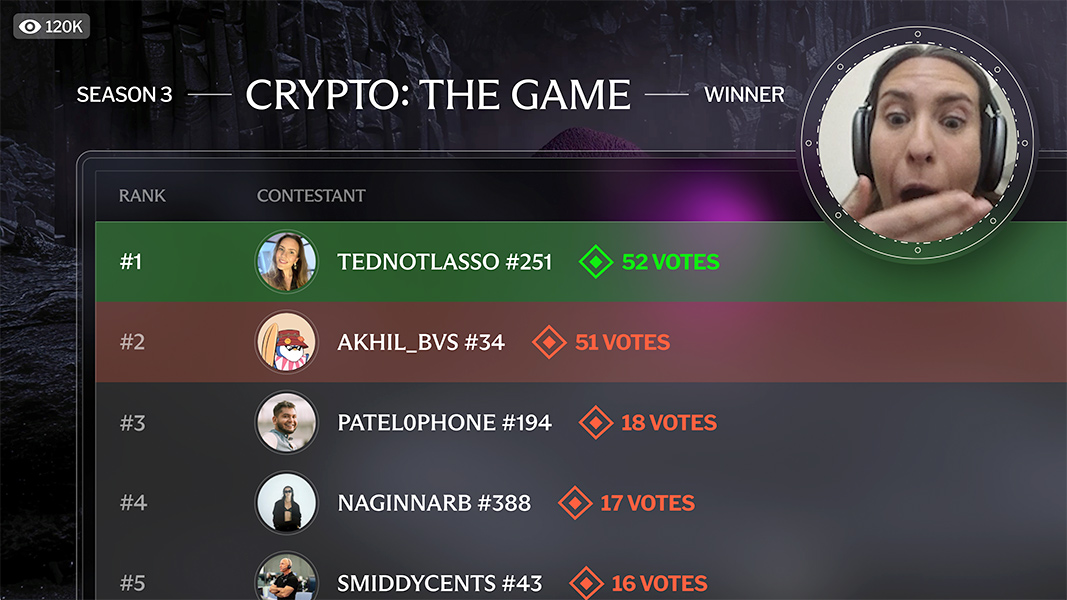Only so many contestants can be cast on reality competition shows like Survivor, Squid Game: The Challenge and The Traitors, but anyone can play Crypto: The Game.
And that’s the point.
A Survivor super fan who has submitted video applications to the CBS mainstay nearly two dozen times and has yet to be chosen (though he isn’t giving up!), Dylan Abruscato created Crypto — the online, fully interactive survival game he says is “equal parts inspired by Hunger Games, Squid Game, Traitors and Top Chef” — because he wants to democratize gameplay.
"I think it’s so antiquated and frustrating that I personally have to apply to Survivor every year, and it’s up to some casting director somewhere to decide if I’m good enough or not,” he tells the Television Academy, asserting, "All of these tried and true formats should live on the internet for the masses to play."
Abruscato has had success in this arena before. As director of partnerships at HQ Trivia, the live quiz app, he was part of a team that earned a 2019 Emmy nomination for masterminding a live, interactive experience in partnership with Warner Bros. to promote the studio’s The Lego Movie 2: The Second Part.
The first season of Abruscato’s Crypto: The Game debuted in January 2024, followed by a second season in three months later. 716 people from around the world competed in the third and most recent season, dubbed Crypto: The Game — Resurrection Island for 10 days in March of this year.
Each contestant bought entry into the latest iteration of the game for 0.1 ETH ($250 U.S. dollars). This season’s winner, a Californian known as Ted (Not Lasso), who had placed second the previous season, took home the game’s nearly $180,000 jackpot.
Here, Abruscato — who began his career in television as an NBC page assigned to season 38 of Saturday Night Live, then went on to work for different networks and studios, including CNBC, before moving into the tech world — talks about the intricacies of Crypto: The Game and what it takes to win.
Television Academy: For those not familiar with it, how does Crypto: The Game work?
Dylan Abruscato: Hundreds of people join, you’re randomly assigned to one of 10 tribes, you compete in digital immunity challenges for your tribe each day. If you win, you’re safe from the vote that night. Everyone else votes people out, and there are twists and turns throughout the game — tribe shuffles, things like that. Similar to Survivor at the end, everyone that was previously eliminated comes back on and votes for the winner.
What did you learn from doing seasons one and two that influenced how season three was designed and played?
I try to do a new twist each season. Season two was called Anon Island — season one had a lot of very notable internet celebrities who played and because of that, they were targeted pretty early. Either folks thought they didn’t need the money, or they just had immediate targets on their back. That influenced the season two decision to give folks the ability to play anonymously. Then, season three was called Resurrection Island, and that was a big twist. If you did get eliminated, similar to Top Chef’s Last Chance Kitchen, you went to a separate part of this digital island and competed in different internet challenges to basically earn your spot back in the competition.
What kind of skills and knowledge do players need to win Crypto: The Game?
One of my favorite things about Survivor is the diversity of challenges. There’s always a physical challenge, or a mental challenge, or a social challenge. There’s an auction challenge every season. I wanted to bring that same level of diversity to our challenges. So we have digital scavenger hunts, digital and cryptographic puzzles, classic arcade games. Pretty much anyone that’s good at those types of things will be good at the challenges. Having said that, I think there are social leaders within each tribe. There is always someone that’s trying to coordinate the votes, someone that’s always very public about their game on social. So I think it’s a nice combination of chronically-online meets good-at-social-games. Ultimately, I think, to win, you need to have a compelling story and narrative and make your case throughout the season.
 Winner "TedNotLasso" scores a slim victory / Photo credit: Crypto: The Game
Winner "TedNotLasso" scores a slim victory / Photo credit: Crypto: The Game
This season’s winner, Ted, won by only one vote. Talk about being close.
The beauty of this thing is that the player or contestants decide who’s going to win. Seasons one and two were landslides. This season, because the votes are coming in live, we could see what was happening, and literally Ted and Akhil, who came in second, were flip-flopping back and forth pretty much the entire time. I think if the voting period had lasted another few minutes, it could have gone either way. But when the time stopped, and we calculated the votes in real time, Ted was the winner. It was a pretty insane moment on the internet. You can take away the production and the crew and the editing, but these formats are always dramatic.
Reality competition shows that are on television have crews made up of directors, producers, camera people, sound recordists, editors. What kind of team do you have?
We’re a team of three. It’s myself, and then Bryan Lee and Tyler Cagle, my co-creators. They’re definitely a bit more on the technical side of things. We all worked together at a tech startup before this, and I knew that they liked Survivor and shows and games like this. I said to them, “Hey, I have this idea. I don’t know if you’d be interested.” Immediately, they loved it. Bryan is a bit more on the back end. He previously worked at DraftKings, so he had a lot of experience building live leaderboards and tournament infrastructure. Tyler is a bit more of a front-end engineer and designer. So yeah, we’re a team of three, and people are always surprised by that.
What can we expect in season four of Crypto: The Game? And do you know when it will launch?
Not yet. I’ve personally been thinking about the idea of humans versus bots, which is unique to the internet. You might not necessarily know who on your tribe is human or not.
This interview has been edited for length and clarity.




